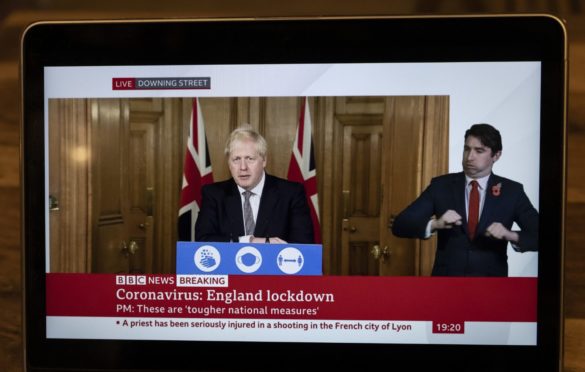The most telling moment in a truly shambolic weekend for the government came at 7.15pm on Saturday night.
Boris Johnson crashed Strictly.
Millions switched on their telly for the weekly spectacle of nonentities and has-beens hoping to jive their careers back to life. Instead they got the PM bumbling through the news that shopping, fun and human contact are to be banned again. Viewers in Scotland might have been particularly peeved given the lockdown doesn’t apply to them. But Holyrood may yet have to fall in line in order to access vital cash support from the Treasury.
Strictly Come Dancing is an odd show if you think about it. The professional dancers are all more recognisable than their so-called celebrity partners these days. But even if you’re not a fan it’s undeniably harmless and wholesome family entertainment.
And it’s surely significantly more popular than the PM.
But the fact no-one in government foresaw that by delaying their inept emergency press conference into the evening they’d upset the viewing habits of so many speaks to this administration’s attitude to families throughout. Repeatedly families are at best an afterthought and at worst taken for granted.
The Conservatives are supposed to like families. The ideological cover for the Tories of the 90s kicking single parents was a drive to keep families together. Families – in all their variety – are a strong and efficient bedrock for a functioning society.
So why do the current crop of Conservatives fail to take them into account?
This is, of course, far more serious than just delaying prime time TV. Within hours of the lockdown announcement new parents were pointing to a serious issue with the guidelines. Those giving birth this year have suffered enough due to coronavirus concerns in hospital and rules excluding partners from antenatal appointments and labour wards. Now the law that only individuals on their own can meet with one other person outside has hamstrung new parents. Since babies count as a person (entirely reasonable in normal circumstances) that means a mother or father with a newborn can’t meet another parent for much needed support and company. Anyone who has known the tricky first few weeks of parenthood would appreciate that’s a rule that can’t hold. But then those deciding on lockdown were apparently all men. Michael Gove has written previously about dodging his children’s bedtime, Dominic Cummings broke lockdown in the spring for fear he’d have to care for his child alone, and Boris Johnson’s a family man only in the sense that he’s started an unknown number of them over the years.
Overlooking the needs of families is a pattern of behaviour. Now the government insists school is the best place for children. Yet six months ago that apparently wasn’t the case. English education secretary Gavin Williamson didn’t feel the need to work flat out to reopen schools. He could do this because the government took advantage of families. Leaving working dads to pick up the slack and leaning even more heavily on mums who shouldered the majority of not just the home schooling but the need to act as chef, entertainments rep and referee around the house.
Taking them for granted and failing to focus on family policy is foolish for a number of reasons.
Firstly, they represent a way out of the economic calamity unfolding. One widely quoted study stated there’s $28 trillion locked up because women can’t access work in the same way as men. A family policy that boosted paternity leave and evened up gender roles at home and at work would free up that cash and swell the global coffers by a quarter. It’s a bit more ambitious than offering everyone a free burger on some days of the week in August. But the prize is significantly more alluring too.
Secondly, and more fundamentally, families represent a way through the coronavirus crisis. At heart, families are about altruism, putting other people’s concerns and welfare before your own.
We’re all part of a family. We’ve got people we want to protect.
And that’s how we minimise the damage done by the virus and arrive at a better destination. Obeying the rules – washing hands, wearing a mask, observing social distancing – is an altruistic act. These are witheringly small steps in the grand scheme of things that can have a big impact. The sort of tiny acts of love we perform every day in bringing up our kids and looking after our parents.
Family policy should not be an oversight or an afterthought, it ought to be at the heart of any administration’s efforts to battle the pandemic.
And Bill Bailey should win Strictly.
James Millar is a political commentator and author and a former Westminster correspondent for The Sunday Post











